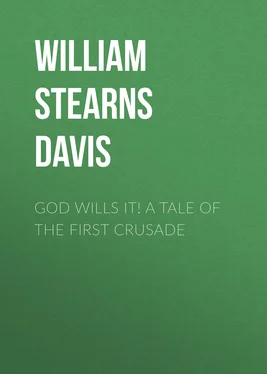William Stearns Davis - God Wills It! A Tale of the First Crusade
Здесь есть возможность читать онлайн «William Stearns Davis - God Wills It! A Tale of the First Crusade» — ознакомительный отрывок электронной книги совершенно бесплатно, а после прочтения отрывка купить полную версию. В некоторых случаях можно слушать аудио, скачать через торрент в формате fb2 и присутствует краткое содержание. Жанр: foreign_prose, foreign_antique, на английском языке. Описание произведения, (предисловие) а так же отзывы посетителей доступны на портале библиотеки ЛибКат.
- Название:God Wills It! A Tale of the First Crusade
- Автор:
- Жанр:
- Год:неизвестен
- ISBN:нет данных
- Рейтинг книги:4 / 5. Голосов: 1
-
Избранное:Добавить в избранное
- Отзывы:
-
Ваша оценка:
- 80
- 1
- 2
- 3
- 4
- 5
God Wills It! A Tale of the First Crusade: краткое содержание, описание и аннотация
Предлагаем к чтению аннотацию, описание, краткое содержание или предисловие (зависит от того, что написал сам автор книги «God Wills It! A Tale of the First Crusade»). Если вы не нашли необходимую информацию о книге — напишите в комментариях, мы постараемся отыскать её.
God Wills It! A Tale of the First Crusade — читать онлайн ознакомительный отрывок
Ниже представлен текст книги, разбитый по страницам. Система сохранения места последней прочитанной страницы, позволяет с удобством читать онлайн бесплатно книгу «God Wills It! A Tale of the First Crusade», без необходимости каждый раз заново искать на чём Вы остановились. Поставьте закладку, и сможете в любой момент перейти на страницу, на которой закончили чтение.
Интервал:
Закладка:
"Given, my lord."
"Good!"—then to an attendant knight, "Send the emir to the pavilion."
But the emir had withdrawn himself, and was not to be found, until amid the clash of Eastern music the arena was cleared and the Moslem game of the wands began. The ten riders who had contended best for the rings were drawn up, five against five. Light round targets were brought them, and in the place of pointed lances, long brittle reeds. He who failed to break his reed on an opponent's target, when they charged at gallop, fell out of the game, unless his rival fared no better. Iftikhar Eddauleh and Musa were arrayed on the same side, with three combatants between. The Count had seen the shadow flit across Mary's face, and reassured: "They will not meet unless the other eight are worsted before either of them—and that can scarcely be; for all are great cavaliers."
Then the kettledrums boomed, while the ten dashed together. A fair sight, without the bloodshed of the Christians' tourney. As each rider swept forward after breaking his reed, he dashed on past attendants standing with a sheaf of unbroken lances, dropped his shivered butt, snatched another, and spurred back to the contest. The horses caught their masters' spirit, and threw up their heels merrily as they flew on charge after charge. Well matched were all; only on the seventh round did an agile Sicilian, by a quick crouch in the saddle, elude an Egyptian's reed while fairly breaking his own. The dust rose high. The horses panted. One by one the combatants dropped out. At last, after the multitude had howled and cheered till weary, the dust cloud settled, and revealed that of one party of five not one remained contesting; of the other, side by side sat Musa and Iftikhar Eddauleh.
The great Count shook his head, and Mary had little joy. They at least knew what fires would spur on the emir, when he rode; but to deny the crowd their sport would have meant riot,—nay, bloodshed,—what with their thousands standing on the benches, pressing the palings, shaking earth and air with tumult. The two contestants mounted new horses and sat face to face; behind each stood an attendant with the sheaf of reed lances. Count Roger swept his eye over the lists.
"Ha! who is that dwarfish fellow behind the emir?" demanded he; and a knight beside answered:—
"Zeyneb, Iftikhar's body-servant and shadow."
Roger did not need to see the cloud that spread on Mary's face. "Holla!" cried the Count, " he is not admitted to the lists! A venomous cat, I hear." A new roar from the benches drowned his voice. The two had charged amid deafening din. Three times past, and the reeds fairly broken; four times,—never drawing rein,—the emir broke only by a great shift; five times, both shivered fairly; sixth time, the Egyptian shattered only his tip, which still dangled from the butt.
"The Spaniard wins!" cried a thousand throats. But the emir had spurred by, dashed up to his attendant, snatched lance, wheeled instantly, and thundered back, Musa flying to meet him.
"Ho!" trumpeted the Count, leaping up, "Iftikhar's lance! See!" In a twinkling the lists rang as never before. The Spaniard reeled in his saddle; his target flew in twain; he clapped his right hand to his shoulder and drew it away—blood!
Prince Tancred had bounded into the arena.
"Felony!" his shout; "the emir had a pointed weapon. Sir Musa is run through. Physicians—aid!"
A dozen squires and grooms buzzed around the Spaniard, making to lift him from his horse. He sat erect—dispersed them with an angry gesture.
"Nothing— Bismillah! The lance turned as it split the target. My side was grazed, and a little blood drawn—it is nothing!"
"Lead Iftikhar Eddauleh this way," raged Tancred, his green eyes fired with his wrath. The emir had deliberately ridden back unbidden. From the benches came countless curses and jeers—Frankish and Arabic; he heeded none.
"What is this doing of yours?" demanded Tancred, very grave. "You rode with a pointed lance—no reed."
The Egyptian drew himself up very proudly.
"By the soul of my father!" swore he, outstretching his hand to Musa, "all men saw we were riding madly, and paying little heed to what was thrust in our hands. Just as we struck, I saw the steel—too late. A pointed lance must have been hidden in the reeds. Allah be praised, you are not slain!"
"This is not easy to believe," began Tancred. Musa cut him short:—
"I accept his oath—I am not disabled. Ride again!"
He cantered to his stand at the head of the lists. Tancred returned to the Count.
"Where is Zeyneb, the emir's dwarf?" demanded Roger.
"By Our Lady," cried the Prince, with a glance—"gone!"
"After him!" thundered Roger. "His was felony or foolishness, best paid by hanging. Lay him by the heels!"
Men-at-arms rushed away; but in neither the multitude nor the city found they Zeyneb.
The two rode once more—met; broke fairly. Men heard their voices for an instant raised high—curse and defiance, doubtless. Who might say? A second time—all eyes following. Mary saw the Spaniard swing nimbly in his saddle. The emir's lance overshot harmlessly; his own snapped fairly on the target. Another mighty shout—Musa had won!
"Again I wish you glory!" said Mary, as she fixed a second diamond aigrette on the cap of the kneeling Spaniard. "May God ever guard you as now, and let you shed glory on your friends!" But this last was in a tone few around might hear.
"And I protest," replied Musa, no louder, "I crave no honor greater than that of serving you."
Mary blushed. She knew the Andalusian meant all he said; yet she was not afraid, as she had been if Iftikhar or De Valmont had so spoken. A page served Musa courteously, bringing him a basin of perfumed water, towels of sweet white linen, and a goblet of cool Aquillan wine. Then he sat with the Count and his party during the noon interval, protesting that Iftikhar had given him but a slight bruise which needed no stanching, though Mary feared otherwise. Very tolerantly he listened to the tale of Gerland, militant Bishop of Girgenti, how in his diocese he had turned his cathedral into a castle—the unbelievers being so many. The squires brought fruit and cakes and wine. The Greek monks—Cosman and Eugenius—whom Count Roger patronized for their poesy, sang a new hymn in honor of the Blessed Trinity; an Arab rival presented a tale in verse of the Count's late raid to Malta, and so the hour passed. The multitude scattered a little, but did not disperse. The best wine had been kept till the last. What were blunted swords or riding with reed lances, beside a duel betwixt gallant knights under their lady's very eye; swords whetted, and life—perchance soul—at stake!
Mary found her heart beating fast. The moments crept slowly. People, she knew, were staring at her,—pointing, whispering her name. Sweet no doubt to feel that scarce a young knight but would nigh give his right hand for a gracious speech from her, hardly a woman but would almost pawn hope of heaven to sit in her place! But when the pure heart of the Greek turned to her dying father and the gallant gentlemen who were hazarding body and soul on her account,—even the bright sun shone darkly.
Richard Longsword had watched the tourney from a lodge at the northern end of the lists beside his fidgeting father and grave-faced mother, trying to enjoy the contests and to forget himself in the tale Theroulde told, while they waited, of the redoubtable paynim knight Chernubles, who could toss four mules' loads like a truss of straw. Herbert growled advice in his ear. Sebastian said never a word, but Richard knew he had lain all that night before the altar, outstretched like a cross while invoking heavenly legions to speed his "spiritual son." Only when Musa and Iftikhar contended, Longsword forgot himself; thrilled at his friend's peril, rejoiced at his victory, and swore a deep, if silent, oath that the emir should not go scatheless on so poor excusings.
Читать дальшеИнтервал:
Закладка:
Похожие книги на «God Wills It! A Tale of the First Crusade»
Представляем Вашему вниманию похожие книги на «God Wills It! A Tale of the First Crusade» списком для выбора. Мы отобрали схожую по названию и смыслу литературу в надежде предоставить читателям больше вариантов отыскать новые, интересные, ещё непрочитанные произведения.
Обсуждение, отзывы о книге «God Wills It! A Tale of the First Crusade» и просто собственные мнения читателей. Оставьте ваши комментарии, напишите, что Вы думаете о произведении, его смысле или главных героях. Укажите что конкретно понравилось, а что нет, и почему Вы так считаете.












